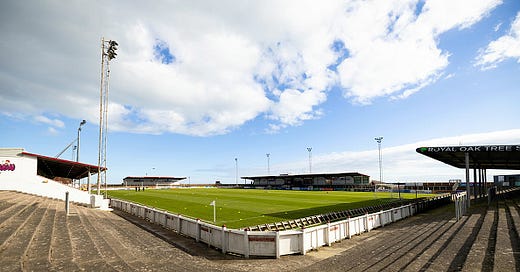The Slaughters of the Innocents
Records state two rival Angus teams racked up 71 goals between them on the same day – but did Dundee Harp actually eclipse Arbroath’s world-famous scoreline?
AS he sat down for a celebratory meal of tripe and potatoes and a glass of ale in the Dundee Arms pub, Tom O’Kane had mischief in his mind. His Dundee Harp side had just wiped the board against opponents Aberdeen Rovers in a first-round Scottish Cup tie. It was September 1885 and the tournament was in its infancy, but Harp’s 35-0 win over Rovers would go some way towards the Scottish Football Association changing the entry requirements for its prestigious cup competition.
O’Kane was enjoying the revelry of a victory that club officials were claiming must be some kind of record, albeit it might even have been greater since the referee had claimed 37 goals were scored only to be corrected by a Harp official, who had detailed 35. For O’Kane, a few goals here or there mattered little, for now. A few years earlier, he had been a member of the Arbroath team that had beaten Dundee Harp in the Forfarshire Cup final but a summer move to their arch-rivals Harp, no doubt inspired by his Irish heritage and, in all likelihood, a financial incentive, had changed all that. O’Kane still resided in Arbroath and the opportunity to get one over on his old team-mates was too good to miss. Not that he needed any encouragement, because the rivalry between Arbroath and Harp was long-established. Therefore officials from the Dundee club found themselves composing a telegram at the local post office of a Saturday evening, bearing a message with the final score inserted in the body of the text before the party continued back at the pub.
A few hours later, a return telegram was delivered to the Dundee Arms much to the amusement of those inside. It simply read: “Arbroath 36-0 Bon Accord”. Those gathered appreciated the wind-up and the good spirit in which Arbroath had apparently taken news of Dundee’s incredible victory. Meanwhile, those at Arbroath believed Harp had been involved in a prank of their own.
The events of the afternoon take some explaining. The various match reports of both games detail the extent of the mismatches that had taken place. Rovers, playing in what was their third-ever fixture, had only just been admitted to the Scottish Football Association and double figures were predicted in the lead-up to the game, a probability made all the greater when they arrived at East Dock Street with only 10 men. Fellow Aberdonians Bon Accord, who were also playing in their third recognised fixture, meanwhile, turned up with only nine players and no goalkeeper. Defender Andrew Lornie took up the position between the sticks while the rest of the Bon Accord line-up was reportedly made up of spectators.
And so the goals began to flow. It took Harp mere seconds to take the lead, and by half-time the score was 16-0. In Arbroath, it was a similar tale of gluttony with the Red Lichties 15 to the good by the interval with the Aberdeen Weekly News reporter noting that the hosts’ goalkeeper Milne “neither touched the ball with hand or foot during the match, but remained under the friendly shelter of an umbrella the whole time”. By the end of play, what had unfolded would be what the Manchester Athletic described as “the slaughter of the innocents”.
It’s scarcely believable that on one dreich September day, two fierce rivals whose line-ups comprised men from the same airts and pairts of Scotland should combine to score 71 goals between them. It’s even harder to conceive that – given they were averaging a goal every two and half minutes – the scorelines might actually have been higher. The referee in the Dundee game admitted that he had found it almost impossible to keep track of the 37 goals that Harp had scored. A club official corrected him, insisting that his side had “merely” struck 35 times and the referee therefore changed the scoreline. The Arbroath result, meanwhile, could have been even crueller than the world record 36-0 had the referee not chalked off seven goals for the hosts.
All of which was to come as a huge surprise to Tom O’Kane. Later that evening, as he made his way through Arbroath East railway station he encountered local bobby Police Constable George Clark and the two fell into conversation about the day’s events.
“Well George,” the Arbroath Herald claims the conversation went, “that was a great victory today.”
PC Clark was full of vigour as he talked about the number of goals that had been scored and O’Kane agreed that it had been an incredible feat.
“It was that,” the constable is reported to have answered. It was only when talk turned to goals disallowed that the Harp defender gave a quizzical look to his companion. “But Dave Stormont (the referee) shouldna hae scored off seven goals.”
At which point O’Kane realised the telegram reply from Arbroath was not a wind-up.
The 35-0 result had already been submitted to the SFA and “the deed was done”
For the remainder of the Saturday evening and early the next morning, O’Kane mulled over the scoreline before deciding action needed to be taken which is why – with the trains off on a Sunday – he found himself traipsing the 18 miles by road from Arbroath back to Dundee shortly after finishing his breakfast. His mission was to have the referee’s scoreline reinstated but his journey was to prove fruitless. The 35-0 result had already been submitted to the SFA and “the deed was done”.
Arbroath’s 36-0 winning margin still stands as a world record in a competitive match (although it was surpassed in a match between Madagascan sides AS Adema and l’Emyrne, a game Adema won 149-0 due to a protest in which l’Emyrne scored 149 own goals). It’s a distinction that perhaps should have been Dundee Harp’s but for an overzealous club official. Or perhaps not. The Aberdeen Weekly News may well provide the conclusive answer to this conundrum since it was the only newspaper to carry a documented list of scorers in its match report.
“The goals were scored respectively by D’Arcy (captain), 10; M’Girl 6; Murphy, 5; Murray, 4; Rock, 3; Lees, 3; Neill, 3; D’Arcy, sen., 1. D’Arcy in the second half scored five consecutive goals, a feat perhaps unequalled in the annals of Association Cup ties,” read the report, thus seemingly corroborating the Harp official’s own record that his side’s tally was, indeed, 35.
Local point-scoring aside, the results had permanent ramifications. The following season, the Scottish Football Association decreed that only teams of a certain standing would be allowed to enter the Scottish Cup henceforth. Within a few years, both Aberdeen Rovers and Bon Accord had ceased to exist – the former absorbed into the club that would become the Aberdeen FC we know today and the latter folding after playing just 13 matches in total.
O’Kane would gain a measure of revenge 12 weeks after the trouncings, when Harp beat Arbroath in the final of the Forfarshire Cup, his side prevailing 5-3 in another goal-fest, with the defender turning in an imperious performance despite catcalls from the Arbroath supporters present.






